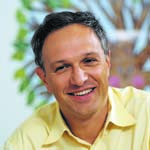The Guggenheim Foundation has selected Washington University in St. Louis Professor Pascal Boyer from among 3,000 nominees to be one of its fellows for 2011.

Boyer
Boyer, PhD, the Henry Luce Professor of Collective and Individual Memory and professor of sociocultural anthropology and of psychology, all in Arts & Sciences, was one of only 180 scholars selected for the highly esteemed honor.
“I didn’t believe it at all,” Boyer says. “When I received the letter, it was written in legalese, and I thought that it must be the rejection letter. I was very happy but still surprised.”
Boyer’s selection is a testament to his cross-disciplinary work in anthropology and psychology, T.R. Kidder, PhD, professor and chair of the anthropology department, says. Boyer focuses on cognitive processes, cultural transmission, cognitive development, evolutionary psychology, cross-cultural psychology and religion.
“The Guggenheim is one of the most prestigious awards any academic can get. It is really recognizing Pascal’s interstitial scholarship at the boundaries of anthropology and psychology,” Kidder says.
“Pascal is simply a brilliant scholar, and his previous publication record is a testament to that,” Kidder says. “His work exploring the cultural and psychological ramifications of religion and religiosity is really quite intriguing. He is one of the few scholars approaching it from that perspective.”
Being named a Guggenheim fellow would be honor enough, but because Boyer’s work crosses various academic disciplines, his selection is an even greater accomplishment, his colleagues say.
Credit also is due to the university for encouraging cross-discipline research, Kidder says.
The fellowship will reflect well on the university, says Gary S. Wihl, PhD, dean of the faculty of Arts & Sciences and the Hortense and Tobias Lewin Distinguished Professor in the Humanities.
“We’ve had a lot of successes this year with our faculty winning major national awards,” Wihl says. “The Guggenheim is really an exceptional achievement and brings a lot of credit to the university and Pascal’s work on memory.”
During the year of his fellowship, which begins in July, Boyer will pursue two research topics: how groups caught in ethnic conflict, particularly in China and South Africa, establish trust with other ethnic groups; and how in-born human psychology affects beliefs about family relations and marriage such as gay unions. The results of his research will be published in a forthcoming book.
“It’s an ambitious project,” Boyer says, but one made possible by the fellowship.
In 2001, he published his third book, Religion Explained: The Evolutionary Origins of Religious Thought, which was preceded by Tradition as Truth and Communication and The Naturalness of Religious Ideas.
As head of WUSTL’s Memory and Development Laboratory, Boyer works with neuro-cognitive systems that are part of the evolutionary makeup of human minds and that support the acquisition of cultural knowledge, concepts and norms. Parts of this research involve studies of adults and young children in natural and lab contexts.
Boyer studied philosophy and anthropology at the University of Paris and Cambridge, where he did his graduate work with Jack Goody, PhD, on the memory constraints on transmission of oral literature. He has done anthropological fieldwork in Cameroon on the transmission of the Fang oral epics and on Fang traditional religion.
An anthropological application of his work was a series of studies on supernatural concepts and their retention in memory as well as a more general description of the cognitive processes involved in transmission of religious concepts.